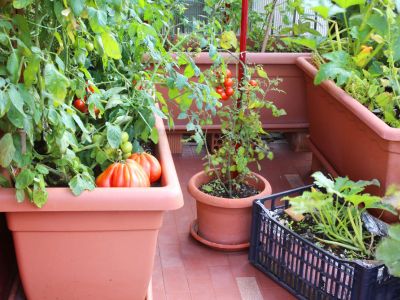Containers for Vegetable Gardens
Before you win any blue ribbons at the county fair, you’ll need something to grow those veggies in, and luckily, just about anything will work. Clay or plastic pots, washtubs, trashcans, whiskey barrels, and buckets are just some of the things you can transform into a mini-garden. Depending on the space available and what you want to grow, your container can be anything from a 6-inch (15 cm.) pot for windowsill herbs to an old bathtub awash with a mix of your favorite vegetables. For some people, the selection of a container can be a chance to express their creativity, turning their garden plot into a conversation piece.
Growing Vegetables in Containers
After selecting a container, it’s important that it provides adequate drainage for excess water. If your container doesn’t have drainage holes, carefully drill one or two in the bottom. These holes will keep your plants from drowning and prevent diseases such as root rot. Now that the container is ready to go, you need dirt. Before sneaking down to the vacant lot on the corner to steal a couple shovelfuls, remember that soil is the most important aspect of any garden. Many people ignore the soil in their rush to start growing vegetables in containers, and in the end are disappointed with their results. Good soil for container gardening needs to be lightweight and loose while also providing for the paradox of good drainage and water retention. Fortunately, you don’t need a degree in agriculture to obtain the right soil mixture. Bags of quality potting mix can be purchased at any nursery or garden center at minimal cost.
Vegetable Plants for Pots
When it comes to vegetable plants for pots, most seed companies offer a nice selection of smaller vegetables specifically designed for gardeners with limited space. Tomatoes, cucumbers, watermelon, squash, okra, and cabbage are just a few of the vegetables that come in smaller forms. These specialized varieties usually look very similar to their larger counterparts and taste just as good. Many regular sized vegetables are also suitable for containers. These include:
carrots leaf lettuce spinach onions turnips radishes peppers beans peas
Most vegetables grow well together, so feel free to mix and match your favorites. Simply follow the planting instructions on the seed packet, provide plenty of sunshine and water, and get ready to enjoy the unparalleled taste of homegrown vegetables in a container garden.
